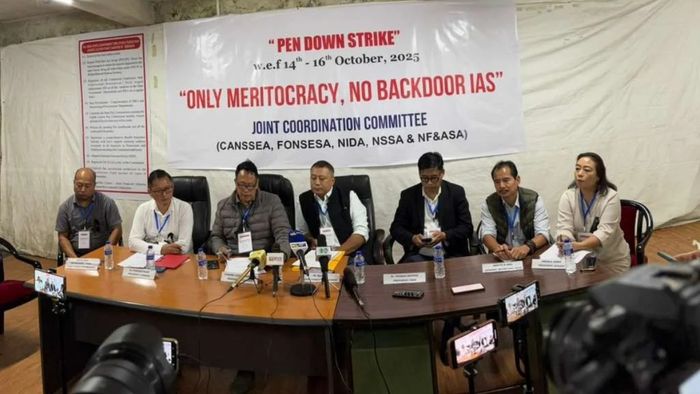Nagaland: Joint Coordination Committee objects to “backdoor” IAS inductions under non-SCS quota
The Joint Coordination Committee (JCC), comprising CANSSEA, FONSESA, NSSA, NIDA, and NF&ASA, has issued a strong clarification regarding the induction of IAS officers from the Non-State Civil Service (Non-SCS) category, amid recent media reports.

- Oct 21, 2025,
- Updated Oct 21, 2025, 6:42 PM IST
The Joint Coordination Committee (JCC), comprising CANSSEA, FONSESA, NSSA, NIDA, and NF&ASA, has issued a strong clarification regarding the induction of IAS officers from the Non-State Civil Service (Non-SCS) category, amid recent media reports.
The committee emphasized that it does not oppose the induction of Non-SCS officers per se, but strongly objects to the inclusion of officers who have entered service through irregular or backdoor appointments. The concern is specific to officers from other State services (excluding the State Civil Services) being considered under the Non-SCS quota without undergoing open, competitive recruitment.
“Inducting officers appointed through irregular means violates the principles of meritocracy and equality of opportunity, erodes public trust, and demoralises deserving officers,” the JCC said in its statement.
Also Read: Neiphiu Rio elected NPF president as general convention ratifies NDPP-NPF merger
Highlighting the need for transparency, the JCC urged the State Government to ensure that only officers recruited through open, competitive, and constitutional processes are considered for IAS induction under the Non-SCS quota. The committee also drew attention to DOPT Office Memorandum No. 49014/7/2020-Estt. (C) dated October 7, 2020, which clarifies that appointments made without open competitive selection are deemed irregular and cannot be regularised for IAS induction.
The JCC further appealed to citizens, student bodies, intellectuals, and civil society organisations to stand united in defending meritocracy, justice, and the rule of law in public service recruitment and career progression.
This statement comes amid growing concerns over administrative appointments and the integrity of the IAS induction process in the State.